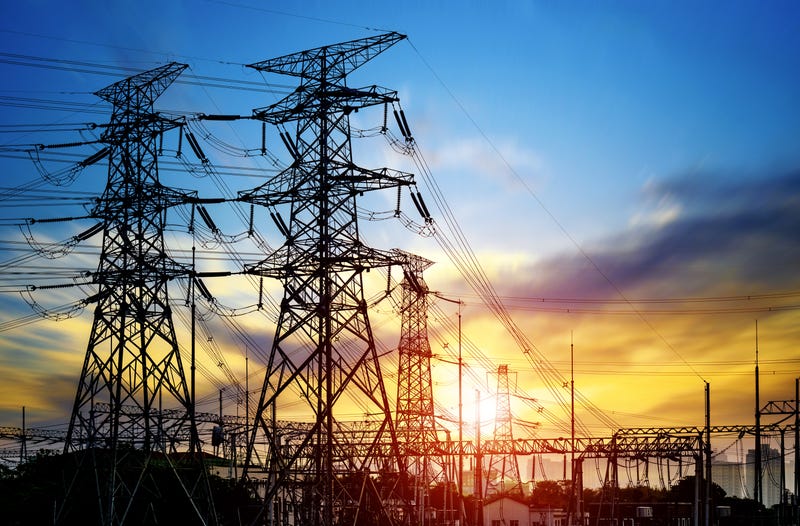
New York State (WBEN) - New York State is going all in on transitioning to an electric state of mind with cars and homes, starting with a ban on natural gas in new residential homes in 2025, commercial buildings in 2030, and the more gradual switch to electric vehicles by 2035.
While some could consider that a rigorous timeline, the Climate Action Council co-chairs, Doreen Harris, CEO of New York State Energy Research and Development Authority and Basil Seggos, Commissioner of New York State's Department of Energy Conservation, beg to differ with that opinion.

"This is a transition that is going to be occurring over many decades for our states, so it's certainly nothing we're doing hastily," Harris said to WBEN's Domenic Cortese. "We're advancing this in a very logical, rational, and thoughtful manner. We are going to use the grid to heat and cool our homes and to power our electric vehicles and beyond. So over the course of the coming decades, we're going to be making significant investments in our grid to ensure it's not only expanded with renewable resources at the center, but also reliable given the real need to use this resource for so many purposes."
Harris mentions heat pump technologies are outselling conventional oil and gas heating and cooling equipment and the technology is there. Countries in Northern Europe for example, have 90% of buildings have this technology installed. "We're really excited to start this process with new buildings being our predominant focus."
Harris mentions, as part of the transitionary process, gas appliances don't have to be out of the homes after 2030, you can use gas until in needs to be replaced. "If your fossil fuel propane heating system operates for 10 or 15 years after 2030, there's no issue with that. It's simply when you replace it, there would be heat pump technologies that would be used instead."
Cortese asks Harris what she would say to Western New Yorkers who feel like they are taking an option away from homeowners. "When we looked at the work of our Climate Action Council over the last number of years, that's one thing that we really talked about is is how does this impact the residents of New York for which we serve," she said. "And what we've concluded is, although different, the technologies that we are advancing, create futures for all of us that are healthier, safer, and more reliable over time. I think about this as is an evolution of technology, more so than taking something away."
As Buffalonians are aware, the grid was called upon during the Christmas Blizzard of 2022 and ultimately failed. Now, we are calling upon further taxing of the grid.
"We certainly have already been hard at work to not only transition our grid to a clean grid powered by renewables and clean energy, but also to build it out so that it is ready to support the technologies that that we know are part of this transition," Harris said. "We have literally dozens and dozens of renewable projects that are under contract are being constructed, and are being developed across our state, because we know that we have to build projects in order to achieve those outcomes."
In terms of affordability to retrofit existing homes to be able to shift to electric, this could prove costly. It is estimated the average cost could be upwards of $25,000 for the average homeowner.
It's been announced that that Governor Hochul will propose legislation to create a universal Climate Action Rebate that is expected to drive more than $1 billion in future cap-and-invest proceeds to New Yorkers every year.
"The governor has proposed this rebate, which would go into the pockets of all New Yorkers to help defray some of those costs," said Basil Seggos. "There's also a small business industrial fund as well, the proceeds from that go into keeping costs down for small businesses. This program, we have not constructed it yet. We imagine it will generate a fairly significant amount of revenue for this transition over time, and ultimately, putting those dollars into defraying the costs of these kinds of upgrades."
The main focus for the state is not on existing houses, it is on new construction. They believe that with the implementation of these electric processes, it would be much easier to scale within the timeframe that they have going forward. As for existing homes, it would appear that there will be possible exemptions and a different timeline altogether.
"When we look at our existing homes and our existing buildings, that's going to be something that advances as we described, over the next number of decades really," Harris said. "When we think about this on an incremental basis, not only are we now able to rely on significant programs from both the state and the federal government to offset increases in costs, but long term savings in energy bills, which is a huge game changer for certainly all New Yorkers, but particularly those in colder climates."
In addition to changing the landscape of homes, there is also a focus on electric vehicles. Electric vehicles do pose a greater risk of catching fire as well as brings an ethical question, "How do we dispose of the batteries?"
Seggos responds: "I would say that there is there's no comparison between the traditional gas. Just the extraction of gas, and the all the various issues that are associated with that and the spills that DC has to respond to every year. I mean, we respond to 13,000 spills in New York every year and a lot of that is just from from gasoline.
Yes, there are issues with with, with some cars, and batteries. We don't dismiss the fact that there are issues with batteries and we don't dismiss the fact that there's issues with with getting cobalt out of the ground. But we have to pursue a policy that makes the most sense ultimately for health and the future of the of the state and ultimately, that's that's driven us into a mindset of electric vehicles."
Seggos believes that the recycling industry will catch up as the industry will expand in the next coming decades.
Moving forward, the co-chairs of the Climate Action Council think this will be the best idea going forward for citizens and this initiative is not something only being done in New York State, but across the country as well.
"We have a very unique alignment between the federal, state and local levels," Seggos said. "You see extraordinary public support for taking action, you see the marketplace developing technologies, you see multi-state initiatives. There's at least 25 other states that are on the same track. You look at a state like Texas, that everyone thinks, perhaps, is more of a petroleum state. Well, they're one of the leaders in solar and wind. The world is moving in this direction."
The full interview will be broadcasted on Saturday, February 11th, 10 a.m. E.T. on WBEN and will be made available to you after air on WBEN.com
